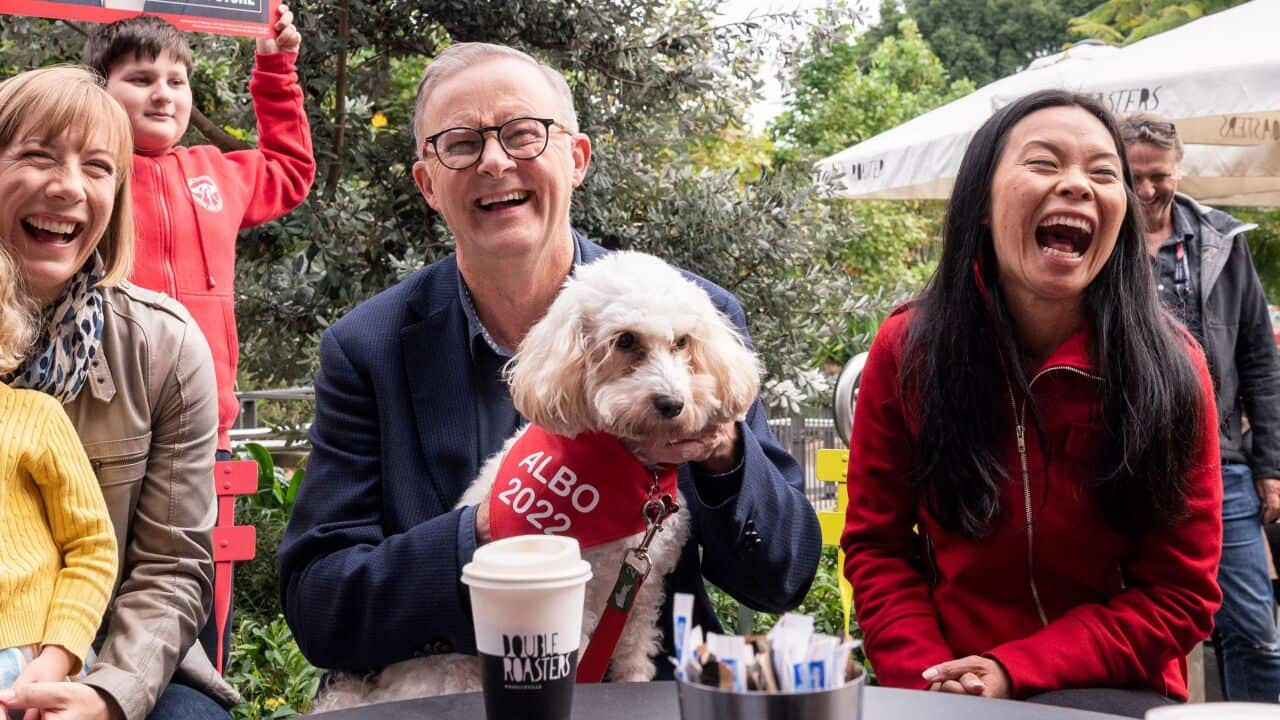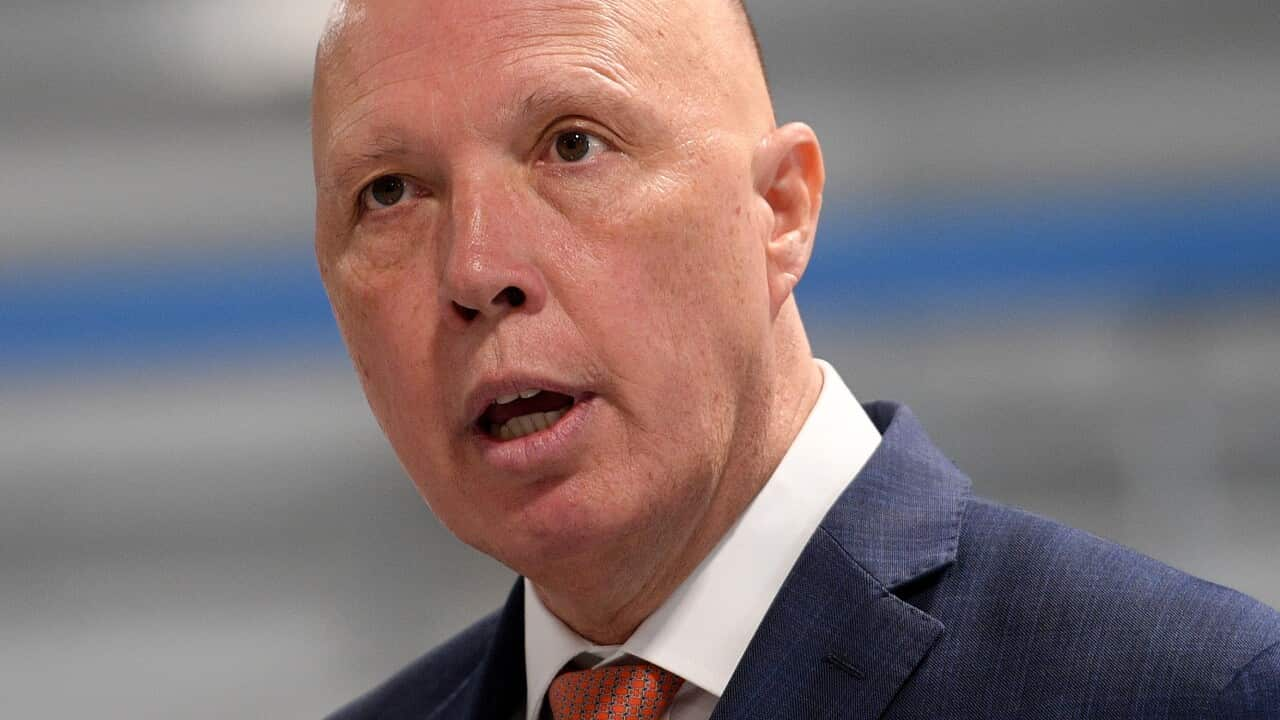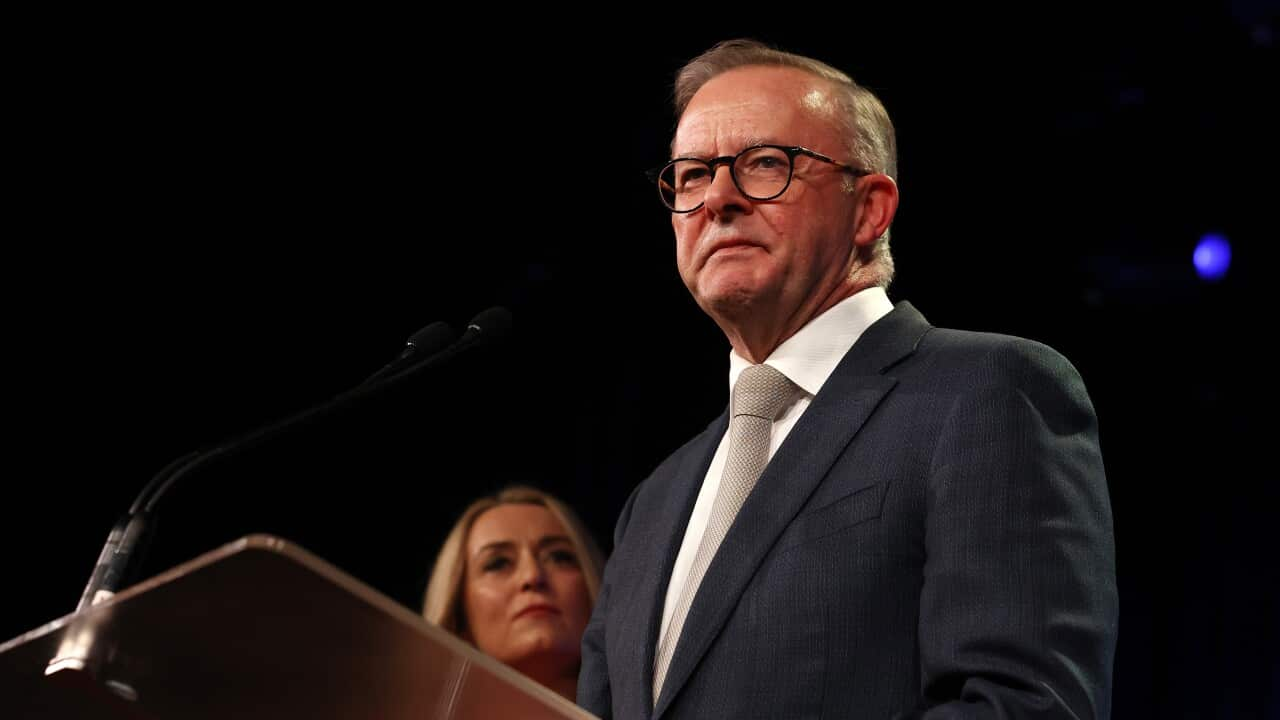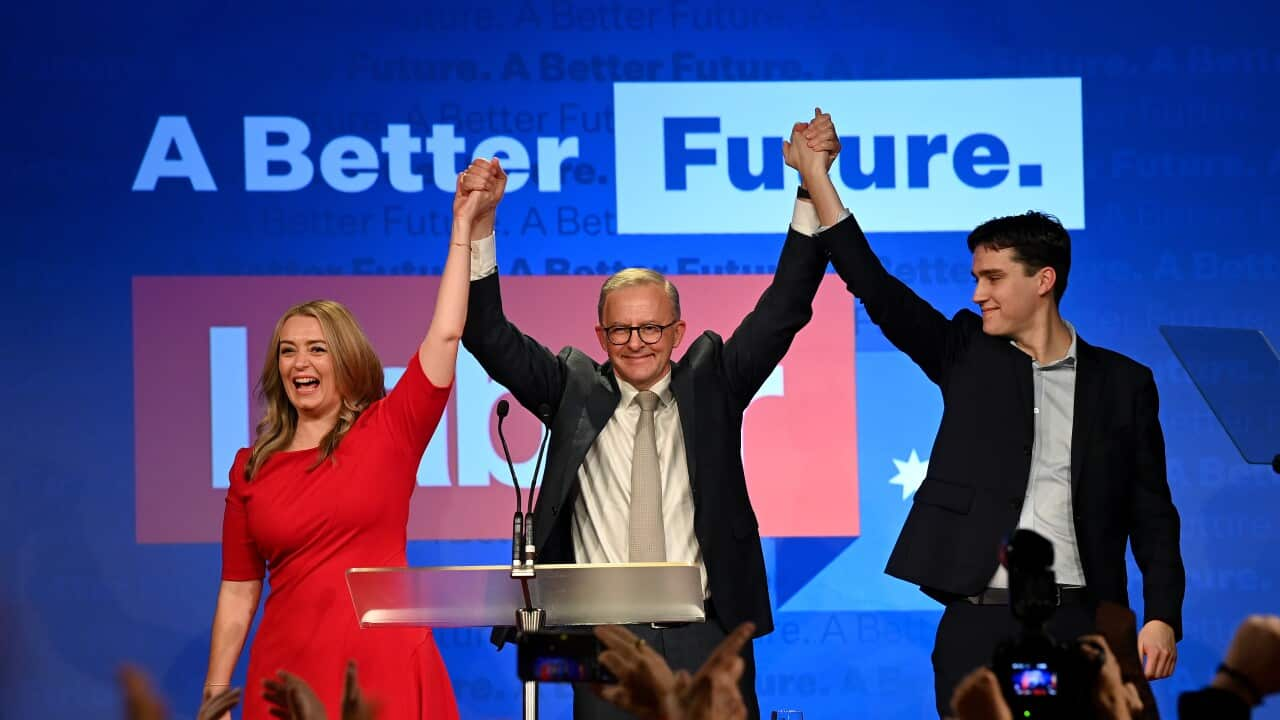"The Australian people have voted for change," Prime Minister-elect Anthony Albanese told an excited room of almost 1,000 party faithful at a Sydney RSL soon after midnight on Sunday morning - along with millions of Australians tuning in from home and election parties across the nation.
The 59-year-old son of a single mum and disability pensioner, who grew up in public housing, said he hopes his journey "inspires Australians to reach for the stars".
"I have put forward a positive, clear plan for a better future for our country," Mr Albanese said, adding that his government aimed to leave no one behind, while holding no one back, and "promote unity and optimism, not fear and division".
"No matter how you voted ... the government I lead will respect everyone of you every day," he told the crowd.

Supporters cheer the arrival of Labor Party leader Anthony Albanese at an event for supporters in Sydney, after Prime Minister Scott Morrison conceded defeat in the federal election. Source: AP / Rick Rycroft/AP
It remains unclear whether those swings will be enough to allow Labor to form a majority government with 76 seats, or whether they will have to rely on support from the crossbench.
But regardless, Australia awaits a new era in politics.
From tackling climate change to scrapping temporary protection visas and overhauling Medicare, here's how we can expect Australia to change under a Labor government.
Pledge to 'end the climate wars'
Neither Mr Albanese nor outgoing Prime Minister Scott Morrison placed climate change front and centre of their six-week election campaigns, yet against the backdrop of natural disasters such as bushfires and floods.
Labor's climate policy goes further than the Coalition's, which analysts say has contributed to their election gains, while the Greens and independents have made significant gains on the back of proposed emissions targets that are stronger still.
Greens leader Adam Bandt, who on Sunday hailed the election result a "greenslide" after his party potentially gained four seats, has said the Greens are willing to talk to Mr Albanese if Labor fails to win a majority.
In his victory speech, Mr Albanese was quick to reiterate his climate promises.
"Together, we can end the climate wars," he said, adding that Australia had the possibility to be "a renewable energy superpower".
Labor's , released in December 2021, outlines commitments to a 2030 emissions reduction target of 43 per cent on 2005 levels, which it says will keep Australia on track for net-zero [emissions] by 2050.
In order to achieve this, Labor has said it would invest $20 billion towards upgrading the electricity grid so it can handle more renewable energy.
The party has also voiced plans to remove taxes on electric vehicles to make them between $2,000 and $12,000 cheaper and install hundreds of community batteries across the country that will be charged by rooftop solar and provide shared energy storage for up to 100,000 households.
There are also plans to install 85 solar banks to benefit more than 25,000 who can't access rooftop solar, such as renters and low-income households.
Under previously announced policies, the public service sector would be required to reach net-zero emissions by 2030, although the Australian Defence Force, Australian Federal Police, Australian Border Force and security agencies would be exempt from this.
Labor would also allocate $3 billion to invest in clean energy technologies like green metals (minerals used in green energy technologies), and seek to adjust the government's so-called "Safeguard Mechanism".
The Safeguard Mechanism would make heavy emitters pay for their emissions, by gradually reducing, over time, the eligibility threshold from 100,000 tonnes of carbon dioxide a year. The Business Council of Australia has proposed a lowering of the threshold to 25,000 tonnes, and Labor has said it would adopt this recommendation.
The Greens have announced a wishlist for negotiations in the event they hold the balance of power in a hung parliament, with a commitment to phasing out coal and gas among them.
Mr Bandt has also said he would call on the next government to sign US President Joe Biden's Global Methane Pledge to phase out methane gas, which is the second biggest contributor to human-caused global warming, after carbon dioxide.

Greens Leader Adam Bandt said his party is willing to talk to Anthony Albanese if Labor fails to win a majority. Source: AAP / LUIS ASCUI/AAPIMAGE
The scrapping of temporary protection visas
Labor's stance on border protection and temporary protection visas has been a subject of confusion during the election campaign, and the party has not released any hard and fast policies on migration, though it has signalled the system needs an overhaul.
Nevertheless, Mr Albanese has indicated that he supports offshore processing, third-country resettlement of asylum seekers and boat turnbacks where it's safe to do so, but he doesn't support temporary protection visas (TPVs).
TPVs are issued to asylum seekers who arrive in Australia without a visa and are subsequently found to be owed protection. They can last for up to three years, and the holders of these visas are allowed to work and have access to Medicare.
The prime minister-elect says Labor may consider granting foreign workers permanent residency if it forms government, given they are already living in the community and paying taxes.
"If you have people who are coming here temporarily, year after year, spending month after month here, why don't we give them a bit of certainty and actually allow people to stay who are making a contribution to the country?" Mr Albanese told the National Farmers Federation conference in April.
In a bid to foster bolder relations with the Pacific following the signing of the China-Solomon Islands security pact, Labor also says it would reform the Pacific mobility scheme and create a new engagement visa to encourage more migration.
Commitment to Uluru Statement from the Heart
In the opening words of his victory speech on Saturday night, Mr Albanese said he committed to "the Uluru Statement from the Heart in full".
"We can answer its patient, gracious call for a voice enshrined in our constitution. Because all of us ought to be proud that amongst our great multicultural society, we count the oldest living continuous culture in the world," he continued.
The Uluru Statement is an agreement of 250 Indigenous delegates and provides a roadmap for recognising First Nations people in Australia’s constitution, calling for an Indigenous Voice to Parliament.
During his campaign, Mr Albanese reaffirmed his previous commitment to achieve an Indigenous Voice to Parliament, saying it should be recognised in the Constitution that Australia's history did not begin in 1788.
But he rejected suggestions it would be a third chamber for parliament, saying the body would allow First Nations people to have a say in policies that affect covering health, education and housing.
In his victory speech, the prime minister-elect told the packed room that Wiradjuri woman Linda Burney would be the government's Indigenous Affairs minister.
Ms Burney takes over from the Coalition’s Minister for Indigenous Australians Ken Wyatt who lost his seat of Hasluck in Western Australia.

Linda Burney will become Anthony Albanese's Indigenous Affairs minister. Source: AAP
Plans to lift wages and tackle cost of living
In an apparent swipe at the Coalition's obsession with the economy throughout its election campaign, Mr Albanese said in his victory speech he wanted "an economy that works for people, not the other way around".
"Together, we can work in common interests with business and unions to drive productivity, lift wages and profits," he said.

Labor Party leader Anthony Albanese says despite how people voted, his government aims to "respect everyone of you". Source: AP / Rick Rycroft/AP
This will include a rise in the minimum wage of 5.5 per cent to keep up with inflation levels — if this is supported by the Fair Work Commission.
He has also pledged to get more women into work by making the childcare subsidy universal. Under the plan, the maximum childcare subsidy will rise from 85 per cent to 90 per cent and the annual payment cap will be removed. Mr Albanese claims the policy will make childcare cheaper for 96 per cent of families.
"Together, we can make forward equal opportunity for women a national economic and social priority," he said after his win.
Plans to strengthen universal healthcare
Healthcare has been a focus for Labor throughout its campaign in its bid to win over marginal seats, with Mr Albanese in his victory speech pledging to "strengthen universal healthcare through Medicare".
The Labor leader has announced , offering an alternative to busy hospital emergency departments for families.
The clinics — dubbed Medicare Urgent Care Clinics — will treat patients needing urgent medical attention, including broken bones, minor burns and stitches for cuts, to free up congested emergency departments.
They will be based at GP surgeries and community health centres nationwide and cost more than $135 million over four years.
Mr Albanese said families would be able to get the care they need without long wait times.
In the final week of the campaign, Labor also pledged to invest $970 million to boost primary healthcare, including the $750 million “Strengthening Medicare” fund to roll out from 2023-24 and a $220 million grants program for upgrades in local GP practices.
Labor says the new funding will improve patient access to GPs and allow the management of complex and chronic health conditions to be simpler and more affordable, which in turn should relieve pressure on public hospitals.
Mr Albanese has also pledged to create a taskforce chaired by the minister for health to consult on a new primary health care strategy with all the medical stakeholders, including the Australian Medical Association, the Royal Australian College of General Practitioners, the Australian College of Rural and Remote Medicine, the Consumer Health Forum, and the National Aboriginal Controlled Community Health Organisation.
Mr Albanese also promised in his victory speech to "fix the crisis in aged care", after in his budget reply speech earlier this year.
Labor wants these positions filled by locals but says in the short term Australia must recruit more overseas doctors and nurses as a "stopgap" measure.
A federal ICAC
And finally, Mr Albanese has pledged to legislate a national anti-corruption commission by the end of the year.
The prime minister-elect said there would be scope for public hearings, and it would be up to the body when they would be held, while retrospective powers would also be a matter for the body to decide.












